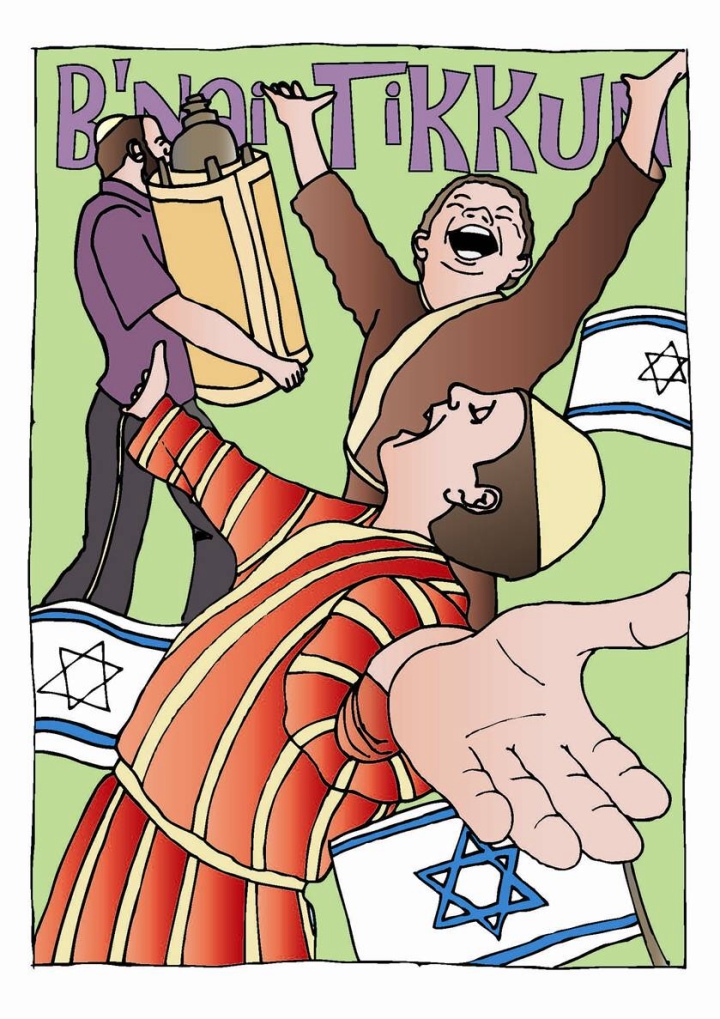On the Jewish calendar: 6 Sivan (May-June)
From the day after the Sabbath, the day you brought the sheaf of the wave offering, count off seven full weeks. Count off fifty days up to the day after the seventh Sabbath, and then present an offering of new grain to the LORD. From wherever you live, bring two loaves made of two-tenths of an ephah of fine flour, baked with yeast, as a wave offering of first fruits to the LORD. Present with this bread seven male lambs, each a year old and without defect, one young bull and two rams. They will be a burnt offering to the LORD, together with their grain offerings and drink offerings-an offering made by fire, an aroma pleasing to the LORD. Then sacrifice one male goat for a sin offering and two lambs, each a year old, for a fellowship offering. The priest is to wave the two lambs before the LORD as a wave offering, together with the bread of the first fruits. They are a sacred offering to the LORD for the priest. On that same day you are to proclaim a sacred assembly and do no regular work. This is to be a lasting ordinance for the generations to come, wherever you live. Leviticus 23:15-21
HOLIDAY BACKGROUND
 After the Jewish nation had their first official Passover and crossed through the Red Sea, they found themselves camped at the base of Mount Sinai. During this time, they rejoiced over their triumphant escape from the Egyptians. They were led in songs by Miriam the cantor, or song leader. Aaron also was leading the people during this time. He is noted for facilitating the creation of the golden calf and allowing the people to fall into idolatry during this time. Soon after this incident, Moses came down from Mount Sinai with the tablets of stone with the Ten Commandments written upon them by the finger of God, only to dash them to pieces upon spying the Israelite camp reveling and making themselves merry around the golden calf. He had to go up to the mountain again to have a new set of commandments in stone. The time period between Passover and the receiving of the commandments (and oral law) was forty-nine days, or the duration of the Omer count. The end of these forty-nine days marked a special day that became known as Shavuot, or as some call it, the Feast of Weeks. (Later to be known as Pentecost in Western Christian culture).
After the Jewish nation had their first official Passover and crossed through the Red Sea, they found themselves camped at the base of Mount Sinai. During this time, they rejoiced over their triumphant escape from the Egyptians. They were led in songs by Miriam the cantor, or song leader. Aaron also was leading the people during this time. He is noted for facilitating the creation of the golden calf and allowing the people to fall into idolatry during this time. Soon after this incident, Moses came down from Mount Sinai with the tablets of stone with the Ten Commandments written upon them by the finger of God, only to dash them to pieces upon spying the Israelite camp reveling and making themselves merry around the golden calf. He had to go up to the mountain again to have a new set of commandments in stone. The time period between Passover and the receiving of the commandments (and oral law) was forty-nine days, or the duration of the Omer count. The end of these forty-nine days marked a special day that became known as Shavuot, or as some call it, the Feast of Weeks. (Later to be known as Pentecost in Western Christian culture).
Much more than simply a “giving of the law,” this time is important, as it marks the anniversary of the covenant between God and the nation of Israel. At Sinai, a marriage-type of agreement, such as a marriage, took place. With the sign of the covenant being the observance of the seventh-day Sabbath (the fourth commandment), the ketubah (wedding vows)- type agreement was set into place. Although Israel had already been designated as God’s people, it was at Sinai that God pledged His love for them by giving them a Torah for them to follow as their pledge of love back to Him. They agreed to God’s terms,”When Moses went and told the people all the LORD’s words and laws, they responded with one voice, ‘Everything the LORD has said we will do.'” Exodus 24:3. Thus the covenant was complete. Both “sides” (God and the people) said their vows and sealed this everlasting covenant. This was part of sanctification and being set apart.
All Jews, past and present, are said to have been present at Sinai-as this was an experience that touched the very quintessence of the Jewish soul for all time. All the more, the covenant cannot ever be considered outdated or “expired,” as it includes those yet unborn.
TRADITIONAL OBSERVANCE
In like manner of the holidays we have discussed previously, the ushering in of the day comes the evening. The day is opened with candles and a charitable mind, as charitable giving and hospitality is always at the fore in celebrating holidays.
CANDLES
Using the candles once again, the following blessing is recited:
The blessing is as follows:
Baruch Ata Adonai, Eloheinu Melech ha-olam, asher kideshanu bemitzvotav vetzivanu lehadlik ner shel Yom Tov.
In English:
Blessed are You Lord our God, King of the universe, Who has sanctified us with His commandments and commanded us to kindle the festival lights.
Following this blessing, we add the Shehecheyanu as demonstrated previously:
Baruch Ata Adonai, Eloheinu Melech ha-olam, sehecheyanu vekiyenamu, vehigianu la’zeman hazeh.
In English:
Blessed are You Lord our God, King of the universe, Who gave us life, and sustains us, and enabled us to reach this season of joy.
NIGHT VIGIL WITH THE TORAH (FIVE BOOKS OF MOSES)
The Feast of Weeks (also Feast of Pentecost) is one of the main pilgrim festivals along with Passover and the Feast of Tabernacles (or Feast of Booths) that required a trip to Jerusalem for proper observance. This is a special time of thanksgiving, celebrated in both homes and synagogues. In appreciation of this “wedding” or, “anniversary” between God and the nation of Israel, it is customary to delve into the Torah during the holiday, staying up all night to read it together. This is one of the main ways of celebrating the day-maintaining a nocturnal vigil, immersing the mind in this ketubah, or marriage contract, between God and the nation of Israel.
FLOWERS
Although Mount Sinai is situated in the desert, to honor the giving of the Torah, the desert is said to have bloomed, sprouting flowers. In honor of this, it is traditional to decorate the house with flowers. Shavuot was also a day for judging fruit trees as to their prospective “fruit forecast” for the year.
PENTECOST
It was during this time that what Christians know as Pentecost took place. Have you ever read the second chapter of Acts and wondered why all the Jews from different places came together on this day? Realizing that it was a Shavuot pilgrimage makes the mystery unravel. The story of Pentecost, according to scripture is as follows:
When the day of Pentecost came, they were all together in one place. Suddenly a sound like the blowing of a violent wind came from heaven and filled the whole house where they were sitting. They saw what seemed to be tongues of fire that separated and came to rest on each of them. All of them were filled with the Holy Spirit and began to speak in other tongues as the Spirit enabled them. Now there were staying in Jerusalem God-fearing Jews from every nation under heaven. When they heard this sound, a crowd came together in bewilderment, because each one heard them speaking in his own language.Utterly amazed, they asked: “Are not all these men who are speaking Galileans? Then how is it that each of us hears them in his own native language? Parthians, Medes and Elamites; residents of Mesopotamia, Judea and Cappadocia, Pontus and Asia, Phrygia and Pamphylia, Egypt and the parts of Libya near Cyrene; visitors from Rome (both Jews and converts to Judaism); Cretans and Arabs- we hear them declaring the wonders of God in our own tongues!” Amazed and perplexed, they asked one another, “What does this mean?” Acts 2:1-12
Notice all the different languages of the people in the room? These were not all locals, but were Shavuot pilgrims. The disciples and Apostles present at this famous event of Pentecost were therefore celebrating the Jewish holiday of Shavuot. This was after the death of the Messiah, so they obviously still observed these feasts as Sabbaths unto the Lord. Notice that they did not consider these holidays as obsolete after Yeshua’s life and death on earth.
YESHUA IN SHAVUOT / JESUS IN THE FEAST OF WEEKS (or FEAST OF PENTECOST)
Soon after his resurrection, Yeshua had given the disciples specific instructions to watch for the Ruach HaKodesh (Holy Spirit). Scripture reads:
After his suffering, he showed himself to these men and gave many convincing proofs that he was alive. He appeared to them over a period of forty days and spoke about the kingdom of God. On one occasion, while he was eating with them, he gave them this command: “Do not leave Jerusalem, but wait for the gift my Father promised, which you have heard me speak
about. For John baptized with water, but in a few days you will be baptized with the Holy Spirit.” Acts 1:4-5
Thus, on Shavuot, after the ascension of Yeshua, the disciples were gathered together. The Holy Spirit visited them, granting them all a portion of Himself by the physical manifestation of fire. Just as on this day, God’s spirit came upon Mount Sinai, manifesting Himself through fire as the law was delivered to the world through His servant, so on this day, God’s spirit came upon those in the upper room as described in Acts, manifesting Himself through fire as the Holy Spirit was delivered to the world through His servants. The parallel is not coincidental. This momentous day in Acts became known throughout Christianity as “Pentecost.” This day is also, and originally, Shavuot. In honoring the “Older Testament” feast of Shavuot, God Himself sent the Holy Spirit to humankind. Not only did the early disciples and believers in Yeshua observe and honor this festival of Shavuot (beyond the life and death of Yeshua on earth), but God (as Holy Spirit) did too!
HOW CAN THIS BENEFIT THE CHRISTIAN COMMUNITY?
Just as the Early Church met together to observe Shavuot, the Christian today may take part in this blessing. God honored the early believers by pouring out His Spirit upon them. This is a special day for two reasons: 1., it is this day of Pentecost- this day that goes down in history as the outpouring of the Holy Spirit, and 2., it is the anniversary of the marriage covenant between God and the nation of Israel into which the Christian church is grafted. Romans 11:17. Staying up and studying God’s word on this day according to the tradition may bring unexpected joys, for we know that the words of the Lord, when read, will not be without blessing.
RECIPES:

